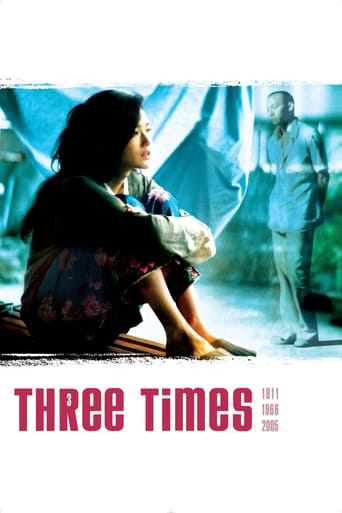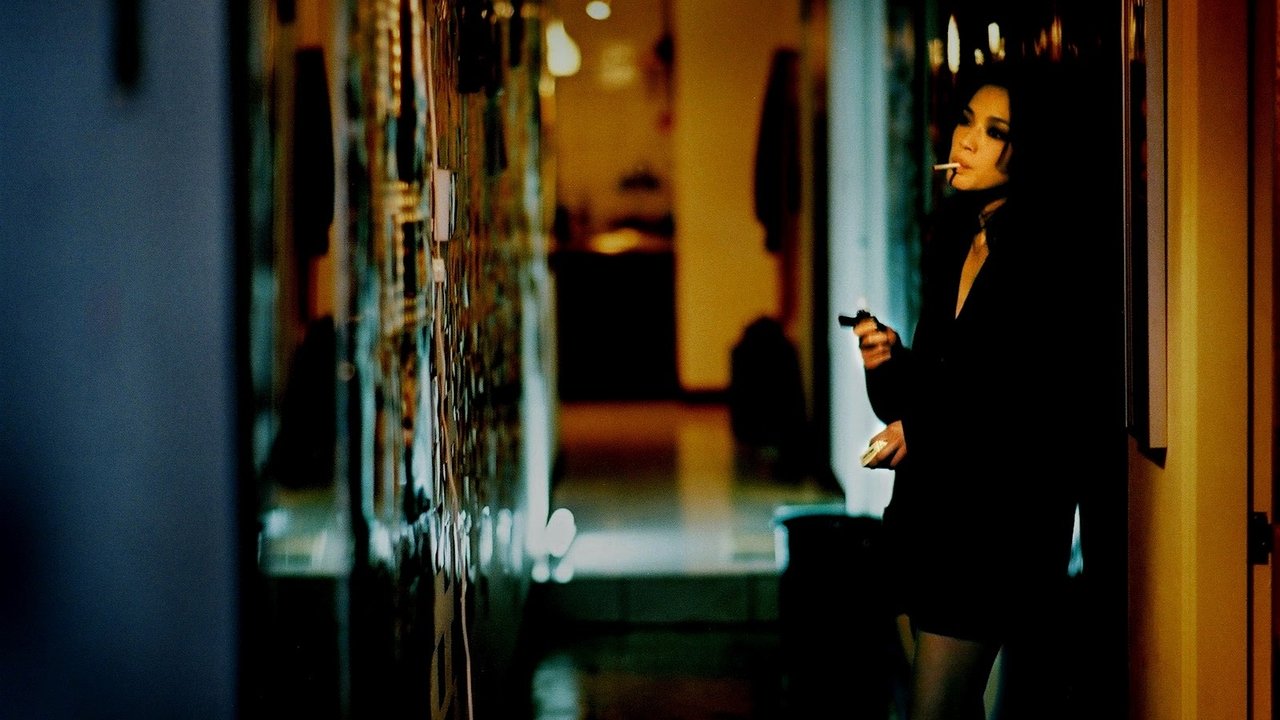Grant Gadbois
There are great aspects of Three Times, but overall the film falls short of entertaining. The camerawork is quite lovely, especially the long takes, as it gives the piece a very special rhythm. The characterization is meaningful yet shallow in all three stories, which makes it hard to connect thoroughly with the characters. The first story is fantastically charming, but the second is beautifully dull, and the third failed to bring this viewer back into the picture. Three Times is an art piece, and should be viewed as such. The majority of modern movie-goers would not enjoy this film, but it does have merit, and this reviewer can most accurately described it as an experiment in cinema.
najania
The cinema of helmer Hou Hsiao-Hsien is sometimes criticized for thin or truncated plots and lack of character development. Perhaps these criticisms are barking up the wrong tree, as I suspect it works on another plane: his movies are neither narrative- nor character- driven, but atmosphere-driven, for want of a better term. "Three Times" is certainly better appreciated if viewed in this light.Hou tells three love stories set at different times (hence the English title) over a period of about 100 years (hence the Japanese title, which translates "Hundred-Year Linked Verse"). In each tale, the star-crossed lovers are diligently played by Chang Chen and Shu Qi. The setting is Taiwan for all. The first is set mainly in billiard halls in 1966, which, however, looks and feels more like what would be 1959 if the location were the States. This impression is reinforced by the apt choice of music; the dominant track is the Platters immortal rendition of "Smoke Gets in Your Eyes," which was released in 1958. We also hear "Rain and Tears," which constitutes a temporal anomaly because it was released in 1968, after the purported time of the story. This is also before the sexual revolution, and the lovers, for all their posturing, are perfectly hesitant, awkward, and unsure. The thirst for love culminates in a tentative reach for the other's hand, merely to hold, at a bus stop.The second tale is set in an up-scale house of pleasure in 1911, and toward the end comes the news of the outbreak of the Xinhai revolution that eventually overthrew the Qing dynasty. It is told silently, any dialogue being presented in inter-titles. It pairs a refined courtesan with a revolutionary-minded man of letters, whose limits end up breaking her heart as well as dashing her dream of freedom, as the piece is actually titled in Chinese (the "dreams" are rendered "times" in English). Despite the absence of spoken dialogue, music is present in the form of old Chinese songs lip-synched by Shu while accompanying herself on a stringed instrument (possibly a "yueqin") and exquisite improvisation by Taiwanese pianist Constance Lee.Coming on the heels of the second, the third tale seems like a slap in the face as we find ourselves abruptly speeding down an expressway in the bustling and gray Taipei of the present. Life is fast, too. Shu is Jing, a jagged-edged new-age bisexual chanteuse who projects an icy persona on stage but is fragile, unstable, and subject to epileptic seizures in reality. Chang plays a biker suitor with whom she eventually finds respite, at least for a while, one hopes. In this "time," the two appropriately waste no time getting into the sack, no questions asked, and the music is appropriately techno and hard.While most reviewers prefer the first Dream of Love, the second dream is clearly the best in my mind. Despite its sluggish pace and what might be taken as temps mort, there is not a single superfluous moment in it. It grinds ever so slowly but inexorably to an emotionally crushing conclusion. The frames are literally pretty as pictures - the comparison by one reviewer here to Vermeer is no exaggeration, especially for one vignette in which the courtesan helps her Mr. Chang dress before a mirror. This is also the extent of physical contact we see between the two, but such restraint only seems to underscore the depth of her love for him.Running through all three dreams is the leitmotif of text, written with a ballpoint pen in the first, brush and ink in the second, and mobile phone in the third. In the first, Chang's character whiles away his hours at the billiard hall with the hostess right beside him, but when he wants to bare his heart, he writes her a letter. In the last, the web and teletext are where the principals go to get key information and deliver messages of real substance. And in the second, the most poignant scene comes when the courtesan, after reading a letter from the delinquent Mr. Chang, is moved to actually stroke the characters on the paper with her fingers, as if they were the hand that had written them and could give solace for her unrequited love.A 10 for the middle piece, which could be likened to a single, perfectly executed episode from Hou's "Flowers of Shanghai," and 6 or 7 for the two bookending it.
evanston_dad
The three times mentioned in this film's title are "A Time for Love," "A Time for Freedom" and "A Time for Youth," each a separate segment set in a different time period (1966, 1911 and 2005) in Taiwan, but featuring the same two actors. In "A Time for Love," the best and sweetest segment, a soldier and a pool hall hostess strike up a timid and shy romance; in "A Time for Freedom," a brothel madame yearns for a political activist for whom she's not allowed to articulate her feelings; and in "A Time for Youth" angst-filled 20 somethings navigate the tricky waters of both same-sex and opposite-sex relationships.All of the segments focus more on the female characters than they do the males, especially the second and third. The director uses clever devices to tie the three segments together, like the use of letters as the primary method of communication in the first and second segments, which morphs into cell phones and e-mails in the third. The whole movie has a languorous feel, as if the director is in no hurry to tell his story. However, this makes the movie feel unnecessarily long, especially given the slight plots that the three segments anchor themselves around. Indeed, the first segment is so touching and poignant, that the final two left me somewhat cold.An interesting Taiwanese film that's worth a look, but not an unequivocal success.Grade: B
KFL
I had initially suggested to my wife that, since this movie consists of three separate stories each 40 minutes or so in length, I would watch all three stories, and then the two of us might watch the best story among the three.This turned out not to be such a great idea. Each of the stories was reasonably interesting, but none was too very remarkable on its own. Instead, the best thing about this film is how it uses the same actor and actress in three completely different contexts. You are pretty much compelled to wonder how much our environment and circumstances shape us and compel our decisions.This is of course somewhat facile. But I'm not referring to a rigorously structured argument about fate etc; I'm talking instead about how seeing these two actors in such dramatically different stories and circumstances induces a respect for chance, kismet, whatever. It certainly isn't rational. That doesn't mean you can't enjoy it.We all indulge in this kind of thing. "What if..." What if I were alive during the Civil War. Or even at the time of Christ, say. Such suppositions elide all the difficult points. So what; it's still fun to suppose. And that's what this movie, arguably, is all about: wondering how the relation between these two people would be so dramatically different in 1963, and 1911, and 2005.



 AD
AD

